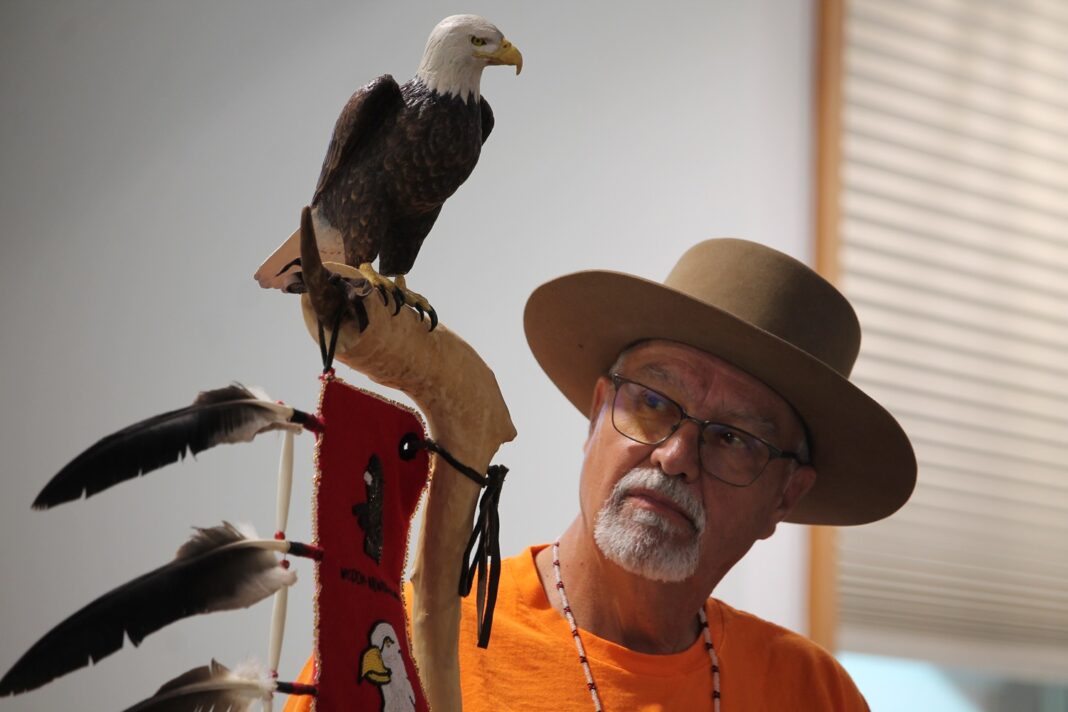While wearing orange T-shirts recognizes children who never returned home from residential schools, or survived colonial institutions, what’s really needed is reconciliaction, Larry O’Connor told students and staff at Haliburton School of Art + Design during National Truth and Reconciliation Day Sept. 30.
O’Connor has been on a years-long journey to rediscover his culture after being raised in Oshawa. However, he was born Anishinaabe Odawa, his home community is Sheshegwaning on Manitoulin Island, and he is from the Bear Clan,
He brought his eagle teaching staff to the college this past Monday, spoke about National Truth and Reconciliation Day, and offered tobacco and smudging to participants.
“Truth and reconciliation is a journey. It’s a long journey,” O’Connor said.
He travelled to Sault Ste. Marie to go through the archives of a residential school there. He found his great grandmother and a great-aunt. He shared some of the comments written adjacent to his great-aunt’s name; “holy untaught, didn’t speak English.” O’Connor said it was because she spoke her own language.
“Our ancestors, our family members went there (to residential schools). Some came home, some didn’t,” O’Connor said.
He added the orange T-shirts recognize that so many lives were lost and must not be forgotten, as “there’s not an Indigenous person on Turtle Island that hasn’t been impacted by the residential schools.”
He said he had heard numbers as high as 69 per cent did not survive residential schools, with graduation rates of just seven to eight per cent, delivering those graduates jobs such as domestics or blacksmiths, where they learned to use their hands, but not their language. “If they spoke their language, they were punished.”
He talked about missing and murdered indigenous women, and the red hand symbol against this.
“Reconciliation requires a lot of good work… and ceremonies. Ceremonies are important. We still have some of our medicines, languages weren’t lost. Had governments been successful, they would have been lost. They’re not.”
He noted treaties allowed people at the college to be on Indigenous land, and his people were glad to share their land, but “there are truths that have to be taught. That’s what truth and reconciliation is all about.
“If it wasn’t for an uprising on an Indian reserve because of a golf course expansion (Oka crisis), we wouldn’t have had that Royal Commission struck… that they dragged out as long as they possibly could… we wouldn’t have those 94 calls to action.
“We recognize in that process so many of our women were gone missing. Another commission had to be held. Two-hundredand-thirty-one (231) calls for justice came out of that.
“Next time there’s an election going on, or someone wants to go to Ottawa, ask them about that. What are you going to do that’s different?
“We can do something. We can have a conversation. They’re good conversations. Sometimes they’re hard conversations… sometimes it’s tough. That’s a good reason why we smudge, too, because it takes some of that burden off of us.”
He ended his talk with, “it’s easy for us to remember Remembrance Day because it’s been around for a long time. This is a conversation that we’re only having now. But the truth is that this needed to happen even before the last Remembrance Day. This is something that is part of our history; a sad part of history of Canada before it was Canada.”
O’Connor hosts Tales from the Big Canoe on CanoeFM the last Wednesday of the month at 6 p.m., rerunning the Friday at 11 a.m. The Township of Minden Hills also raised a Truth and Reconciliation flag at its municipal office building Sept. 26.





